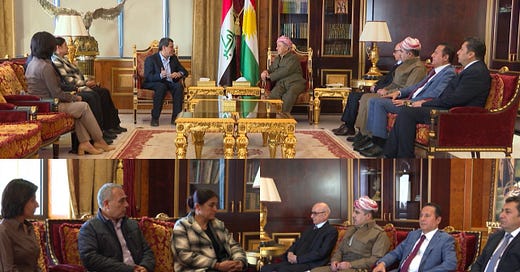What do we know about the Mazloum Abdi-Barzani meeting and what to make of it?
First, the composition of the meeting: alongside Mazloum Abdi, the SDF delegation included the commanding officers of its two core military wings - YPG general commander Loqman Khalil and YPJ commander Rohalta Efrin. While the SDF encompasses various Arab formations that maintain operational autonomy, these two forces constitute its military nucleus. Their presence is telling because Turkey specifically designates these components as PKK affiliates. The delegation's composition also dispels narratives about rifts between Abdi and the YPG regarding PKK ties or suggestions that he's carving out an independent powerbase in Syria.
To fully understand the importance of this meeting, it must be examined on two levels: its symbolic resonance and its geopolitical substance:
1. This meeting holds immense symbolic importance in Kurdish regional politics. It represents the first formal interaction between senior leaders of the only two Kurdish-led regions in the world. Descriptions of the meeting as “historic” are not exaggerated. Kurdish social media platforms have been abuzz with discussions, and there were even celebratory parades in Qamishli, Syrian Kurdistan. Regardless of the practical outcomes, the meeting has provided a significant psychological boost to Kurds across the region.
The ideological gulf between the delegations also manifested in their composition: arzani's traditional entourage included his brother Sidad Barzani, confidant Azad Barwari, Syria portfolio head Hamid Darbandi, and staff. In contrast, Abdi's delegation of three included two women so half of the delegation, symbolizing the gender-inclusive principles of the PKK-linked Öcalan ideology. This contrast reflects deeper ideological divides: Barzani represents entrenched tribal and feudal Kurdish leadership traditions, while Abdi embodies the more revolutionary ethos of the PKK, which arose to challenge those traditional structures.
2. Geopolitically, the sequence of recent events illuminates the underlying dynamics: On December 7th, Masrour Barzani met with Turkish President Erdoğan and Turkish intelligence officials, with Syria as a key agenda item. The following day, Masoud Barzani held talks with Syrian Kurdish factions allied with his party. Five days later, a Barzani envoy traveled to Hasakah to meet with Abdi. Shortly afterward, Abdi met with Barzani in Erbil. These all happened in less than ten days.
In the background, Turkey—supported by its ultranationalist allies—is reportedly engaging in discussions with PKK leadership to end the decades-long conflict. This broader context, and the new realities in Syria, rather than US involvement, is the primary driver of the meeting. While the US plays a role—Abdi travels exclusively via US military helicopters for security—the Americans have long sought a Barzani-Abdi meeting without success. The timing now reflects shifts in Turkey’s strategic considerations.
On the substance of Abdi-Barzani discussions: while reports indicate Barzani conveyed Turkish positions to the SDF leadership, characterizing him as merely an intermediary is misleading and oversimplifies his role. Barzani has his own vested interests in these discussions, particularly in strengthening the influence of his proxies, such as the KDP-S and allies within the Kurdish National Council (KNC).
Barzani maintains a complex relationship with Turkey - while he coordinates closely with Ankara on strategic matters and acknowledges Turkish security imperatives, particularly regarding the PKK, he retains significant autonomy in pursuing his own regional agenda. The PKK issue exemplifies this dynamic: containing PKK influence serves both Turkish interests and Barzani's own political calculations given the longstanding PKK-KDP competition for Kurdish leadership. Thus, while the dialogue proceeded with Turkish blessing and likely addressed Turkish concerns, it equally advanced Barzani's interests - bolstering his diplomatic value to Ankara while securing leverage for his Syrian Kurdish allies in ongoing negotiations with Damascus and as the new Syria takes shape.




